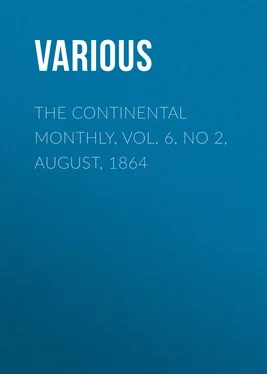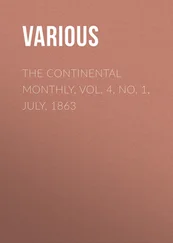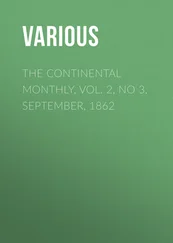Various - The Continental Monthly, Vol. 6, No 2, August, 1864
Здесь есть возможность читать онлайн «Various - The Continental Monthly, Vol. 6, No 2, August, 1864» — ознакомительный отрывок электронной книги совершенно бесплатно, а после прочтения отрывка купить полную версию. В некоторых случаях можно слушать аудио, скачать через торрент в формате fb2 и присутствует краткое содержание. Жанр: foreign_antique, periodic, Языкознание, Политика, foreign_edu, на английском языке. Описание произведения, (предисловие) а так же отзывы посетителей доступны на портале библиотеки ЛибКат.
- Название:The Continental Monthly, Vol. 6, No 2, August, 1864
- Автор:
- Жанр:
- Год:неизвестен
- ISBN:нет данных
- Рейтинг книги:4 / 5. Голосов: 1
-
Избранное:Добавить в избранное
- Отзывы:
-
Ваша оценка:
- 80
- 1
- 2
- 3
- 4
- 5
The Continental Monthly, Vol. 6, No 2, August, 1864: краткое содержание, описание и аннотация
Предлагаем к чтению аннотацию, описание, краткое содержание или предисловие (зависит от того, что написал сам автор книги «The Continental Monthly, Vol. 6, No 2, August, 1864»). Если вы не нашли необходимую информацию о книге — напишите в комментариях, мы постараемся отыскать её.
The Continental Monthly, Vol. 6, No 2, August, 1864 — читать онлайн ознакомительный отрывок
Ниже представлен текст книги, разбитый по страницам. Система сохранения места последней прочитанной страницы, позволяет с удобством читать онлайн бесплатно книгу «The Continental Monthly, Vol. 6, No 2, August, 1864», без необходимости каждый раз заново искать на чём Вы остановились. Поставьте закладку, и сможете в любой момент перейти на страницу, на которой закончили чтение.
Интервал:
Закладка:
Another important sign of the times, as evincing our advancing civilization, is the revival of art in our midst. In the midst of all our bustle and toil and eager strife for gain, there has ever been a something wanting to the completeness of our life, a something to fill and satisfy that yearning of the soul for æsthetic beauty, which is at once an evidence of its progress and its capacity for diviner things. Too long have we been absorbed by the desires of our animal nature, in whose pursuit there is little gratification to that finer portion of our inner selves which will not be silenced by anything short of the deepest degradation. The people—the great people—need something—something higher, more ennobling, more tender—to fill the vacant spot in their hearts and homes, to preserve the balance between the animal and the spiritual part of their lives, and to clothe their surroundings with a higher and holier significance than can arise from the events and associations of the work-day life. In art the missing link is found, and whether it be the simple ballad in the evening circle or the modest print that graces the humble cottage walls—and the humbler the habitation the deeper the manifestation, because the more touching—it is but the expression of the people's appreciation of the needs, the capacities, and the holier aspirations of the better part of humanity. Hence the revival of art has a deep significance; it is something more than a forced, an exotic, and hence ephemeral growth; it is the manifestation of the awakening of the people to the æsthetic sentiment; it is the actual result of the intellectual and moral needs of society; it is in itself the striving of a great people for the beautiful and true. And as such it has a broad and deep foundation in the godlike in human nature, which shall insure not only its permanence but its progress as long as the good and the true have any influence whatever upon our society. That we have had, until a comparatively late period, no art among us, is the result not of a lack of capacity to comprehend the beautiful, but of the intense and all-absorbing passion for gain which has so nearly proved the bane of our society by shutting out the consideration of better things: that art has so suddenly revived in our midst is a proof that, so far from having our humanity, our political position, our very civilization itself swallowed up in the love of the almighty dollar, as has been predicted of us by foreign wiseacres, we have been aroused to our danger and to a true appreciation of the better part of existence; which is itself an evidence of the elasticity and the recuperative energy of our social system.
In literature our progress is not so flattering. In its effects upon civilization a literature can only be judged by that portion of it which touches the popular heart, which descends to the humblest fireside, and is most eagerly sought after by the ploughboy and the operative. All other, however brilliant it may be—and the more brilliant or profound the farther it is generally removed from the minds of the masses—is to them but as the stars of a winter night, cold and distant, radiating little warmth to the longing soul, too far away to awaken more than a faintly reflected admiration. He who said, 'Give me to write the songs of a people, and I care not who makes their laws,' touched the tender spot in the great heart of humanity; he was a sage in that truest of philosophy, the study of human nature. Though we have our princes in every branch of literature, who are the result of and an honor to our civilization, yet for their own results in moulding the tastes, the habits, and the intellects of the common people, in contributing to their advancement, they fall far below the efforts of the veriest penny-a-liner. It is a lamentable fact of our society that while the more solid literature scarcely pays, the flashiest of so-called 'flash literature' brings down the golden shower. The writer of the lowest possible order of literary productions is enriched, and his name is familiar in the remotest corners of the land, while our monarchs of literature are oftentimes poverty stricken and comparatively obscure; and that because the latter is confined to a comparatively small audience and patronage, while the former speaks to and for the masses; and, as a natural consequence, the former controls the tastes of the greater portion of the reading community, and that too for anything but good, since he reaps his golden harvest by pandering to the basest of appetites, the lowest of sensibilities and sympathies; thus retarding rather than accelerating the intellectual advancement of the people, this being his material interest.
And how great is the responsibility of those who thus speak to the ear of the simple and the unlearned! how terrible the retribution they are heaping up for themselves in the great hereafter, for thus prostituting talent which might be made eminently useful in leading the minds of the common people to the highest and noblest of truths; in making purer and better in every sense of the word! The idea that the province of literature, even of fiction, is simply to amuse, is exploded in the light of advancing civilization. Every writer has a higher mission, and accordingly as he discharges the duty which his faculty lays upon him, is he true or false to the true end of his existence, a success or a failure in the world of intellect and morality. The mission of all literature is to make mankind both wiser and better , and the writer who fails to appreciate and act upon this truth is worse than a useless cumberer of society; he is a curse to his age, and, however great his present fame, will most assuredly be forgotten with the passing away of his generation. For does not all human effort resolve itself into this one thing? Is there any work which we call good or great, or even important, which is not intended in some way to benefit mankind? Else we were but butterflies, and our works but mists. In the past ages the world has not seen and appreciated this fact; but the world of to-day does appreciate it, and will certainly set every worker upon his proper pedestal, high or low, according as his efforts have conduced or not to the welfare of humanity.
Present reform in this particular is not to be looked for; it must be external rather than internal. Could the whole mass of light literature be at once and forever swept out of existence, the people would soon acquire a love of solid reading as ardent as that which now pervades the lower stratum of our society for 'yellow-covered' trash. For the love of knowledge is innate, and the people would necessarily seek for and find amusement in such reading as could not fail to instruct and educate, to revive this love of knowledge, and fan it into an ardent flame. But this cannot be done. The people will ever seek that reading which is most congenial to their present tastes and habits, and there will ever be found a legion of those who are eager to supply this sort of mental pabulum—if it can be so called—for the sake of the golden equivalent. For these reasons, the literature of the common people must ever follow, not lead, their civilization; it must continue to be the outward and visible sign of their progress, instead of the inward and spiritual grace by which it is pervaded and sustained; and reform must be inaugurated and consummated in those other influences which tend to mould the moral man, and which must be so guided as to destroy all these low and grovelling tastes, by lifting the man into a higher plane of being, in which the animal shall be wholly subservient to the spiritual. Hence the province of the true philanthropist lies in those other paths which we have pointed out, rather than in this, since in them lies the prospect of success whose fruits will in this most clearly appear.
It is a significant fact that the foreign view points to but two blots upon our society, and that foreign detractors harp continually upon these, and these alone, as evidences of the backwardness of our civilization—the institution of slavery and the riots which occasionally disgrace our large cities. For in the light of the facts and experience of to-day, such a position is simply a yielding of the whole question. When it is considered that the few riots with which we are afflicted—few in comparison with those which so often convulse European society—are almost invariably incited and sustained by our foreign population, and that portion of it, too, latest arrived upon our shores, it will be seen with what injustice the evil is laid at the door of American society. It is, in fact, nothing else than the outbreak of the long-accumulated and long-suppressed discontent and misery of European lands, which, for the first time for centuries, finds vent upon the shores of a land of political and social liberty—a reaction of the springs long held down by the iron hand of tyranny—a violent restoration of that natural elasticity which had so nearly been destroyed by ages of social degradation. The mob law, the frequent resort to the pistol and the bowie knife, and the universal social recklessness of our own citizens of the Southern States, is the effect of the institution of slavery, and falls within the discussion of that question, with the disappearance of which they must inevitably depart.
Читать дальшеИнтервал:
Закладка:
Похожие книги на «The Continental Monthly, Vol. 6, No 2, August, 1864»
Представляем Вашему вниманию похожие книги на «The Continental Monthly, Vol. 6, No 2, August, 1864» списком для выбора. Мы отобрали схожую по названию и смыслу литературу в надежде предоставить читателям больше вариантов отыскать новые, интересные, ещё непрочитанные произведения.
Обсуждение, отзывы о книге «The Continental Monthly, Vol. 6, No 2, August, 1864» и просто собственные мнения читателей. Оставьте ваши комментарии, напишите, что Вы думаете о произведении, его смысле или главных героях. Укажите что конкретно понравилось, а что нет, и почему Вы так считаете.












